
NUTRIENT CYCLING IN AGROECOSYSTEMS
Scope & Guideline
Championing Nutrient Efficiency for a Greener Future
Introduction
Aims and Scopes
- Nutrient Management Strategies:
Research on various strategies for managing nutrients in agroecosystems, including the use of organic and inorganic fertilizers, cover crops, and innovative practices to enhance nutrient use efficiency. - Soil Health and Fertility:
Investigations into the effects of different farming practices on soil health, including organic amendments, tillage practices, and their impact on soil nutrient availability and cycling. - Environmental Impact Assessments:
Studies assessing the environmental implications of nutrient management practices, including greenhouse gas emissions, water quality, and the sustainability of agricultural practices. - Circular Economy in Agriculture:
Exploration of concepts related to nutrient recycling and the circular economy, focusing on minimizing waste and maximizing resource use in agricultural systems. - Crop Production and Yield Optimization:
Research aimed at understanding the relationships between nutrient management, crop productivity, and yield optimization in various cropping systems.
Trending and Emerging
- Innovative Fertilizer Technologies:
There is a growing interest in the development and application of enhanced efficiency fertilizers, biochar, and other innovative amendments that improve nutrient use efficiency and reduce environmental impacts. - Climate Resilience and Adaptation Strategies:
Research focusing on strategies to enhance the resilience of agroecosystems to climate change, including the optimization of nutrient management under varying climatic conditions. - Integration of Technology in Nutrient Management:
The use of precision agriculture technologies, machine learning, and data-driven approaches to optimize nutrient management practices is on the rise, reflecting advancements in agricultural science. - Circular Economy and Waste Utilization:
An increasing emphasis on circular economy concepts, particularly the recycling of nutrients from waste materials, is evident in recent publications, highlighting the importance of sustainability in agriculture. - Soil Microbial Dynamics:
Emerging research on the role of soil microorganisms in nutrient cycling and their interactions with plants is gaining traction, underscoring the importance of biological factors in nutrient management.
Declining or Waning
- Traditional Fertilization Techniques:
Research focusing on conventional fertilization methods has seen a decrease, likely due to a growing emphasis on sustainable and innovative practices such as precision agriculture and organic amendments. - Single Nutrient Focus Studies:
Studies that concentrate solely on a single nutrient's impact without considering broader interactions within nutrient cycling are becoming less common, as holistic approaches gain traction. - Limited Scope of Soil Types:
There is reduced research on nutrient cycling in specific soil types or regions, as more comprehensive studies that encompass diverse agroecosystems are prioritized.
Similar Journals
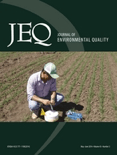
JOURNAL OF ENVIRONMENTAL QUALITY
Pioneering Research for Environmental ExcellenceJOURNAL OF ENVIRONMENTAL QUALITY, published by Wiley, is a premier academic journal in the field of environmental science, dedicated to advancing knowledge in areas such as environmental engineering, waste management, water science, and pollution control. With an ISSN of 0047-2425 and an E-ISSN of 1537-2537, this esteemed journal is recognized for its rigorous peer-review process and impactful research contributions, reflected in its Q2 category rankings across multiple subfields as of 2023, including a notable rank of #57 in Waste Management and Disposal. The journal serves as a vital platform for researchers, professionals, and students aiming to address contemporary environmental challenges through innovative solutions and policies. Covering a history of over five decades, from 1972 to 2024, the JOURNAL OF ENVIRONMENTAL QUALITY continues to be an essential resource for high-quality research and discourse in the pursuit of a sustainable environment.

Agronomy-Basel
Fostering Collaboration in Crop Management and SustainabilityAgronomy-Basel is a leading international journal dedicated to advancing the field of agronomy and crop science, published by the respected MDPI. Since its inception in 2011, this open-access journal has provided a vital platform for the dissemination of high-quality research, featuring innovative studies and reviews that contribute to the understanding of agricultural practices and crop management. With an impressive impact factor and ranked in the Q1 quartile of its category for 2023, Agronomy-Basel has established itself as a premier resource in the realm of Agricultural and Biological Sciences, achieving a commendable rank of #62 out of 406 in its field, placing it in the 84th percentile. The journal targets researchers, professionals, and students who are dedicated to enhancing agricultural sustainability and productivity. Located in Basel, Switzerland, the journal's commitment to open access empowers global accessibility to flourishing agricultural advancements, thus fostering collaboration and innovation across the globe.
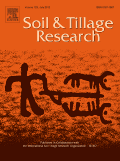
SOIL & TILLAGE RESEARCH
Pioneering Research in Soil and Tillage PracticesSOIL & TILLAGE RESEARCH is a premier international journal dedicated to advancing the understanding of soil science and tillage practices through high-quality research and insightful reviews. Published by Elsevier and based in the Netherlands, this esteemed journal boasts impressive impact metrics, being ranked in the Q1 category across multiple domains including Agronomy and Crop Science, Earth-Surface Processes, and Soil Science, reflecting its pivotal role in the academic community. With an H-Index that underscores its citation impact and a Scopus ranking placing it in the top percentiles of its field, SOIL & TILLAGE RESEARCH serves as a vital resource for researchers and professionals focusing on sustainable agricultural practices, soil management, and environmental conservation. This journal provides a platform for open dialogue and dissemination of knowledge that shapes future research directions and policy-making in land use and sustainable agriculture.
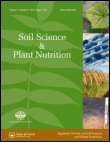
SOIL SCIENCE AND PLANT NUTRITION
Nurturing research for thriving ecosystems.SOIL SCIENCE AND PLANT NUTRITION, published by Taylor & Francis Ltd, stands as a prominent journal in the fields of plant science and soil science, with its impact reflected in its Q2 ranking across both categories in 2023. Established in 1955, this journal provides a vital platform for researchers, professionals, and students dedicated to understanding the complex interactions between soil and plant nutrition, with an emphasis on advancing sustainable agricultural practices. With an impressive Scopus ranking, placing it in the 75th percentile for Plant Science and the 71st for Soil Science, it attracts high-quality, peer-reviewed articles that contribute significantly to the body of knowledge in these disciplines. While the journal does not currently offer Open Access options, its comprehensive scope encompasses studies from fundamental research to applied science, making it an essential resource for anyone engaged in soil management, agronomy, or related fields.
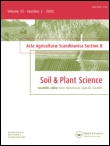
ACTA AGRICULTURAE SCANDINAVICA SECTION B-SOIL AND PLANT SCIENCE
Bridging Science and Practice in Agronomy and Soil ScienceACTA AGRICULTURAE SCANDINAVICA SECTION B-SOIL AND PLANT SCIENCE, published by Taylor & Francis AS, is a distinguished journal dedicated to the fields of Agronomy, Crop Science, and Soil Science. With an impressive impact factor, and categorized in Q2 for both Agronomy and Crop Science and Soil Science as of 2023, this journal is an essential resource for researchers, professionals, and students aiming to advance their understanding of soil-plant interactions and sustainable agricultural practices. Operating since 1992 and continuing through to 2024, ACTA aims to publish high-quality, peer-reviewed research that encourages the applicability of advanced scientific knowledge in real-world agricultural settings. While the journal is not open access, it remains widely accessible through institutional subscriptions, reflecting its commitment to disseminating essential findings and fostering innovation in soil and plant science worldwide. Nestled in the vibrant academic environment of Norway, ACTA AGRICULTURAE SCANDINAVICA serves as a key platform for nurturing groundbreaking research that informs sustainable agricultural policies and practices globally.

Transactions of the ASABE
Empowering engineers to tackle global agricultural challenges.Transactions of the ASABE is a premier journal published by the American Society of Agricultural and Biological Engineers, specializing in innovative research and practical applications in the fields of agricultural and biological engineering. With an ISSN of 2151-0032 and E-ISSN 2151-0040, this journal has established a vital niche in disseminating high-quality scholarly content that addresses the complex challenges faced in agriculture and biological systems. The journal operates under an open access model, facilitating broad dissemination of research findings to a global audience. This commitment to accessibility is reflected in its coverage of diverse topics, including agriculture, soil science, food science, and environmental engineering. Although the journal's coverage in Scopus was discontinued in 2021, it once ranked among the top in its categories, indicating its significant contribution to advancing knowledge in these essential fields. Researchers, practitioners, and students are encouraged to engage with the Transactions of the ASABE to stay abreast of developments and foster collaboration in promoting sustainable engineering solutions.

CANADIAN JOURNAL OF SOIL SCIENCE
Advancing Soil Knowledge for a Sustainable FutureThe Canadian Journal of Soil Science (ISSN: 0008-4271, E-ISSN: 1918-1841) is a premier publication in the field of soil science, proudly published by Canadian Science Publishing. Established in 1974, this esteemed journal aims to promote high-quality research and insights into the dynamic interactions within soil ecosystems, addressing pressing issues such as soil health, management, and sustainability. With an impressive 2023 category quartile ranking of Q2 in Soil Science and a Scopus ranking placing it in the 52nd percentile, this journal stands out as a key resource for researchers, professionals, and students alike. Although currently not open access, the journal provides valuable content that contributes to advancing the understanding of soil science, an essential discipline for agricultural innovation and environmental stewardship. As we approach its converged years through 2024, the Canadian Journal of Soil Science is poised to continue its pivotal role in disseminating impactful research and fostering a community dedicated to soil science excellence.
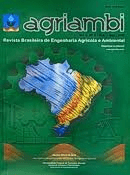
Revista Brasileira de Engenharia Agricola e Ambiental
Pioneering Research in Agricultural and Environmental SciencesRevista Brasileira de Engenharia Agricola e Ambiental, published by the Universidade Federal de Campina Grande, serves as a pivotal platform for researchers and professionals in the fields of agricultural and biological sciences, agronomy, and environmental engineering. With an open-access policy since 2000, this journal aims to foster global dissemination of innovative research and practices, ensuring that high-quality findings are accessible to all. Operating in Brazil, it holds notable rankings, including Q2 in the categories of Agricultural and Biological Sciences (miscellaneous) and Agronomy and Crop Science, indicating its strong academic impact and influence within these fields. As of 2023, it ranks #68 out of 193 in Agricultural and Biological Sciences and #188 out of 406 in Agronomy and Crop Science, representing its commitment to advancing scientific knowledge. The journal primarily focuses on publishing studies that address challenges in agricultural engineering and environmental sustainability, making it an essential read for students, researchers, and professionals who are dedicated to innovation and excellence in these dynamic fields.
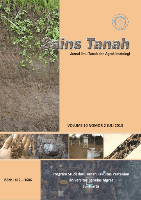
SAINS TANAH
Championing Research for a Greener TomorrowSAINS TANAH is a renowned peer-reviewed journal that focuses on the fields of agronomy, soil science, and environmental studies, published by Universitas Sebelas Maret Surakarta in Indonesia. Established as an Open Access platform since 2001, it aims to disseminate high-quality research that addresses critical issues in soil health, crop management, and pollution, thereby fostering sustainable agricultural practices. With its current impact factor demonstrating a Category Quartile ranking of Q3 and Q4 in major areas such as Agronomy and Crop Science, Atmospheric Science, and Pollution, SAINS TANAH serves as an essential resource for researchers, professionals, and students dedicated to advancing knowledge and solutions in these vital fields. By providing a collaborative environment and upholding rigorous academic standards, the journal not only highlights the significance of Indonesian research contributions but also aims to connect local insights with global agricultural and environmental challenges.
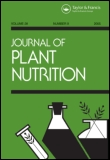
JOURNAL OF PLANT NUTRITION
Transforming Plant Nutrition Research into Practical SolutionsJOURNAL OF PLANT NUTRITION, published by Taylor & Francis Inc, is an esteemed peer-reviewed journal dedicated to advancing the field of plant nutrition and agronomy. With an ISSN of 0190-4167 and an E-ISSN of 1532-4087, this journal has been at the forefront of research since its inception in 1979 and continues to provide critical insights through 2024 and beyond. It is recognized for its rigorous scholarship, ranking Q2 in Agronomy and Crop Science and Q3 in Physiology as of 2023, highlighting its significance in both the agricultural and biological sciences. The journal's Scopus ranks further reinforce its impact, placing it in the 71st percentile for Agronomy and Crop Science and the 42nd percentile for Physiology. Researchers, professionals, and students alike benefit from its comprehensive coverage of topics, fostering a greater understanding of plant nutrient dynamics and their implications for sustainable agriculture. While the journal is not open access, it remains a vital resource for those dedicated to advancing agricultural practices and enhancing crop productivity in an era of global food challenges.